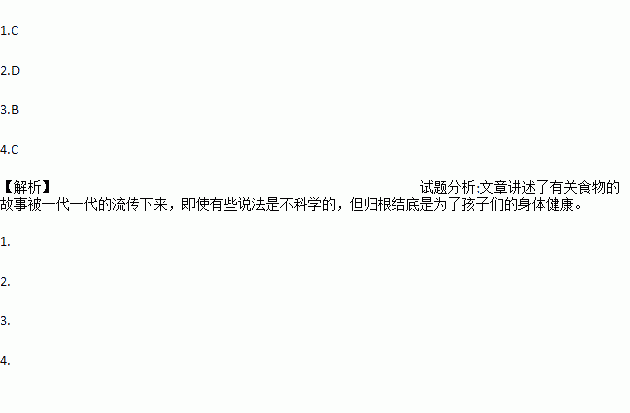题目内容
Adults are happy to tell their children that crusts (面包皮) will give them curly hair, carrots will help them see in the dark, and spinach will make them strong. Even though adults know it's not totally true, they think it's good for their children's health, a study had found.
In a study about 31 per cent of adults said they once told their children the curly hair tale, and 36 per cent said they'd been told the same thing by their mother or father. Among the over-50s, almost half said they'd been promised curly hair if they ate their crusts. A quarter of the 2,000 adults questioned in the study told their children carrots would help them see in the dark. This could be true to some extent because of the high levels of vitamin A and beta-carotene in root vegetables.
Another favorite among parents is that milk will make one strong. A third surveyed said their parents told them this, and about 29 per cent said they told their children the same thing. But while there is plenty of evidence to suggest milk is good for people's health, there are also a lot of scientific papers saying it isn't.
Thanks to Popeye, spinach is also fed to children, along with the idea that it will make them strong. While there is also some truth in this one, scientists now believe it is not the iron, but the inorganic nitrates (无机硝酸盐) that improve physical power.
One in seven of the surveyed admitted telling their little ones that runner beans will make them run faster, which is nothing more than wordplay and has no basis in science. Almost one in five adults were subjected to the same tale in childhood.
Just over one in 10 parents told their children green food would turn them into a superhero, and a quarter admitted hiding vegetables in meals.
Lyndsay Jones, spokesman for Persil Washing Up Liquid, said, "It's clear that the most persuasive stories about food are passed on from generation to generation. Our research shows that the ideas continue, and we tell our kids the same things our parents told us, even if they're not always entirely true."
Crusts may not make your hair curly, but there's plenty of research that says crusts contain more of the goodness than the rest of a loaf. Hopefully, as a result of our Cook with Kids promise, more parents will be encouraged to spend time with their children in the kitchen and teach them the truth about food.
1.We can know from Paragraph 3 that ________.
A. a third people are forced to drink milk by their parents
B. milk is beneficial to children's physical strength
C. there is doubt whether milk is helpful to people's health
D. about 29 percent people wish their children good health
2.Which of the following does Lyndsay Jones agree?
A. Adults are willing to teach their children as their parents did.
B. Most persuasive stories about food are false.
C. Stories about food shouldn't be passed on from generation to generation.
D. Parents can't make sure if some stories about food are totally true.
3.We can learn from the passage that ________.
A. scientists think the iron in spinach helps children grow strong
B. parents are expected to tell children the truth about food
C. runner beans can really make children run fast
D. crusts are said to contain less nutrition than a loaf
4.How is the passage mainly developed?
A. By following time order B. By making comparisons.
C. By giving examples D. By analyzing causes.
 名校课堂系列答案
名校课堂系列答案

